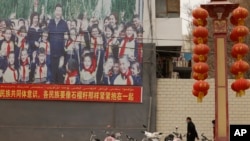Asylum-Seeker Attacked in Kazakhstan After Fleeing Xinjiang
Kaster Musakhan, an ethnic Kazakh seeking asylum in Kazakhstan after escaping imprisonment in Xinjiang, China, was assaulted by four unidentified individuals in Almaty. The attackers left him with injuries, including a broken rib and a damaged kidney. Musakhan believes the assault is linked to his vocal criticism of Chinese authorities' treatment of Muslims in Xinjiang. This incident adds to a series of attacks on Kazakh asylum-seekers, raising concerns about potential Chinese involvement.
Xinjiang Tours, China's Narrative Amid Human Rights Concerns
Beijing has been arranging visits to Xinjiang for foreign diplomats and journalists to showcase the region's development and counter allegations of human rights abuses. While some visitors, like Moiz Farooq from Pakistan, praised Xinjiang's prosperity, others, like Albanian-Canadian journalist Olsi Jazexhi, left shocked after witnessing what they considered attempts to eradicate Islam. Critics argue that these organized tours serve as a tactic to amplify China's narrative and contradict global criticism of its human rights record. The international community, including the United Nations, has expressed concerns about potential crimes against humanity in Xinjiang, with accusations of forced labor and cultural suppression.
China Adds Jobs in Xinjiang, But Forced Labor Concerns Persist
China recently announced the addition of 456,000 workers in Xinjiang in the first 10 months of the year, framing it as a sign of successful economic development. However, Uyghur experts and activists argue that many of these jobs involve forced labor of individuals who have been or are still detained in reeducation camps. Authorities are accused of using forced labor to maintain surveillance on the Uyghur population, subjecting them to Chinese control throughout the workday.
Survivor's Chilling Account of China's Coercion in Xinjiang Crackdown
Gulpiya Qazybek, an ethnic Kazakh from Xinjiang, reveals the horrifying details of her role in China's ethnic crackdown, shedding light on the brutal tactics employed by the Chinese government. Qazybek, a former government employee tasked with monitoring families, recounts being ordered to round up Muslim families and witnessing their distressing arrests. Her account exposes the coercion faced by Uyghurs and Kazakhs, who were compelled to implement oppressive policies against their own communities. Despite escaping to Kazakhstan, Qazybek continues her fight for justice, demanding the release of her elderly mother and others still suffering under China's harsh measures.
China Battles Sanctions, Targets US Firms Linked to Xinjiang Research
China has retaliated against U.S. sanctions by imposing new restrictions on U.S.-based firms involved in gathering open-source data about business connections to Xinjiang where the U.S. accuses China of forced labor of Uyghurs. The move is seen as an attempt to force companies to choose between the U.S. and Chinese markets. The latest restrictions target U.S. data analytics firm Kharon, its director of investigations Edmund Xu, and Xinjiang-focused researcher Nicole Morgret.
Uyghur Jailed for Islamic Studies 11 Years Ago
A Uyghur crane operator, Ebuzer Abbas, who was previously arrested for pursuing Islamic studies in Xinjiang's Ili Kazakh Autonomous Prefecture, has been confirmed by Radio Free Asia to be in jail after a sudden new detention in May. The 24-year-old was arrested at his home in Ghulja's Kepekyuzi Ara Mehelle district, according to his cousin Nureli Nuraxun, who lives in Turkey.
Rights activists and experts are criticizing China's recent law on ethnic embedding in Xinjiang as the first step in legalizing China's assimilation policies in the region. The new regulation actively encourages comprehensive embedding of other ethnic groups in Xinjiang into Han Chinese culture, utilizing measures such as economic subsidies and neighborhood optimization with gradual ethnic mingling. Experts shed light on the historical roots and impact of the new regulation.
Quote:
"So-called 'fostering a sense of national identity from kindergarten' means intensifying China's push on ethnic assimilation, promoting and imposing Han Chinese culture onto other nations, eradicating different ethnic and national identity of Uyghurs and other Turkic people in Ghulja, East Turkistan."
— Zubayra Shamseden, Chinese Outreach Coordinator at the Washington-based Uyghur Human Rights Project and vice president of Munich-based World Uyghur Congress.




